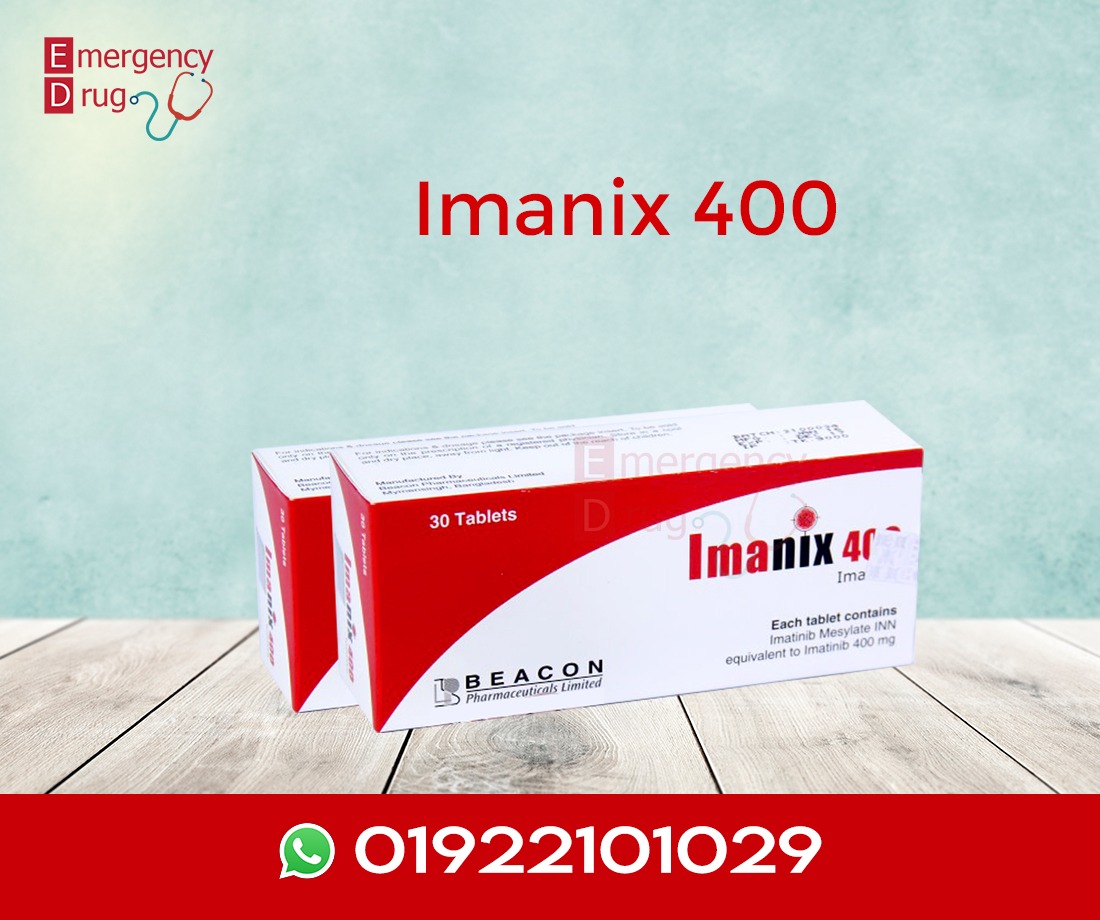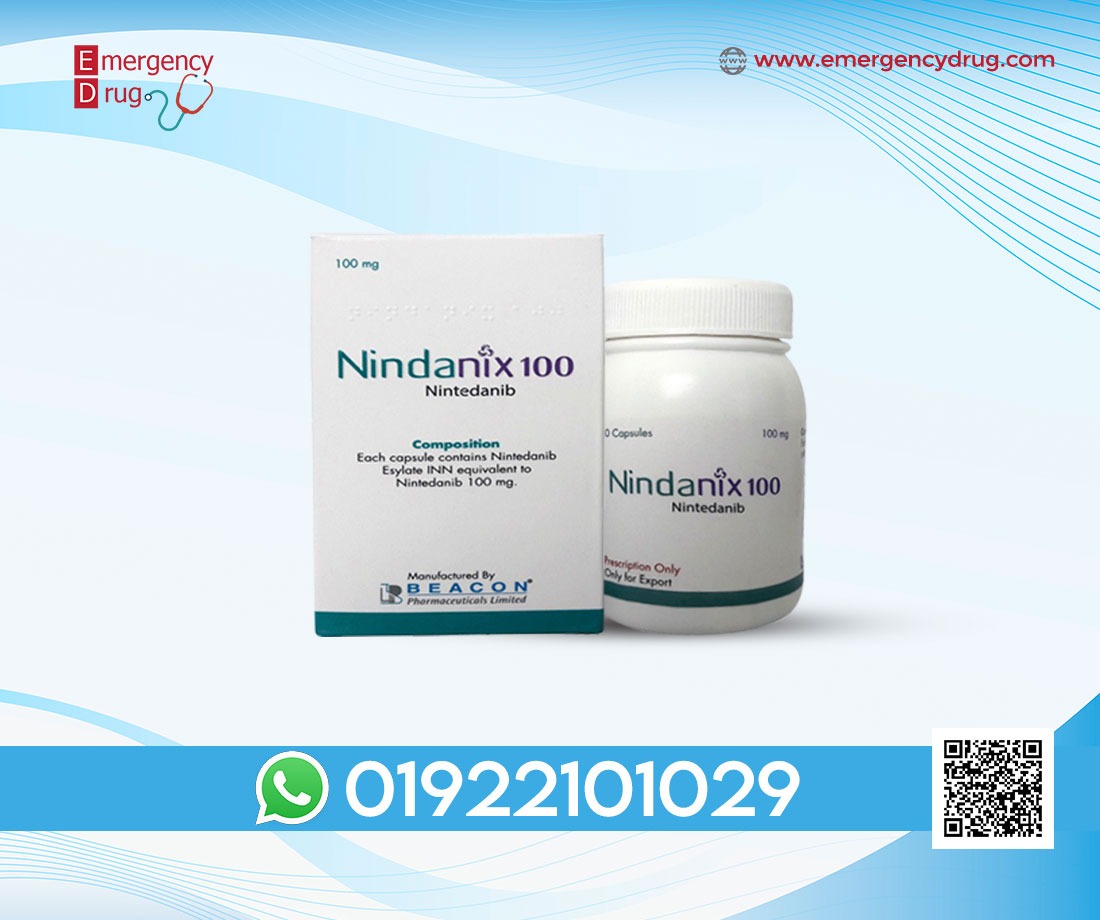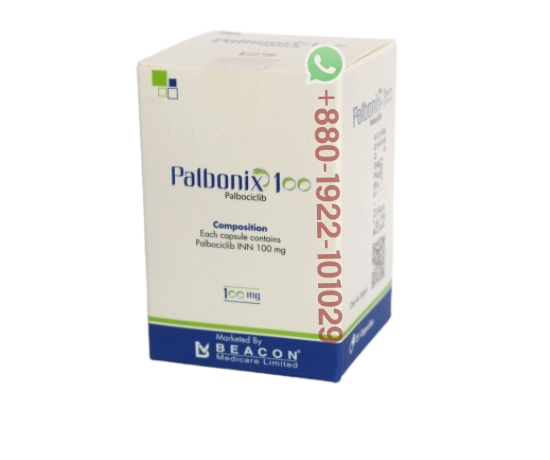
Imanix (Imatinib) 400 MG – 30 Tablets
Price: $160.00
Imatinib is a type of cancer growth blocker called a tyrosine kinase inhibitor (TKI). Tyrosine kinases are proteins that cells use to signal to each other to grow. They act as chemical messengers. There are several tyrosine kinases, and blocking them stops the cancer cells from growing. Imatinib targets different tyrosine kinases, depending on the type of cancer.
Commercial Pack: Each box contains 30 tablets.
Produced and manufactured by: Beacon Pharmaceuticals Limited


Description
Introduction:
Imanix 400mg belongs to the class of medicines known as tyrosine kinase inhibitors. It treats blood cancer (chronic myeloid leukemia and Acute lymphocytic leukemia) and gastrointestinal stromal tumors. Imacent 100 should be taken with food, but it is better to have it at the same time every day to get the most benefit. It would be best if you continued taking it as long as your doctor advised. The duration of treatment varies according to your need and response to treatment. Taking it in the wrong way or taking too much can cause severe side effects. It may take several weeks or months to see or feel the benefits but do not stop taking it unless your doctor tells you to. This medicine’s most common side effects include rash, vomiting, abdominal pain, and diarrhea. Other than this, water retention and swelling are commonly observed side effects. Let your doctor know if you experience unexpected rapid weight gain. Your doctor may advise regular monitoring of blood cells and liver function while taking this medicine. Do not drive or do anything requiring mental focus if you experience dizziness and blurry vision. Many other medicines can affect or be affected by; this medicine lets your healthcare team know all medications you are using. This medicine is not recommended during pregnancy or while breastfeeding. Effective contraception by males and females during treatment is essential to avoid pregnancy.
Uses of Imacent 100:
- Blood cancer (Chronic myeloid leukemia)
- Blood cancer (Acute lymphocytic leukemia)
- Gastrointestinal stromal tumor.
Indications:
- Newly diagnosed adult and pediatric patients with Philadelphia chromosome positive chronic myeloid leukemia (Ph+CML) in chronic phase.
- Patients with Philadelphia chromosome positive chronic myeloid leukemia in blast crisis, accelerated phase, or in chronic phase after failure of interferon-alpha therapy.
- Adult patients with relapsed or refractory Philadelphia chromosome positive acute lymphoblastic leukemia (Ph+ ALL).
- Pediatric patients with newly diagnosed Philadelphia chromosome positive acute lymphoblastic leukemia (Ph+ ALL) in combination with chemotherapy
- Adult patients with myelodysplastic/myeloproliferative diseases associated with platelet-derived growth factor receptor (PDGFR) gene re-arrangements.
- Adult patients with aggressive systemic mastocytosis without the D816V c-Kit mutation or with c-Kit mutational status unknown.
- Adult patients with hypereosinophilic syndrome and/or chronic eosinophilic leukemia who have the FIP1L1-PDGFR a fusion kinase (mutational analysis or fluorescence in situ hybridization [FISH] demonstration of CHIC2 allele deletion) and for patients with HES and/or CEL who are FIP1L1-PDGFRa fusion kinase negative or unknown.
- Adult patients with unresectable, recurrent and/or metastatic dermatofibrosarcoma protuberans.
- Patients with Kit (CD117) positive unresectable and/or metastatic malignant gastrointestinal stromal tumors.
- Adjuvant treatment of adult patients following complete gross resection of Kit (CD117) positive GIST.
Pharmacology:
Imatinib is a small molecule protein-tyrosine kinase inhibitor that potently inhibits the activity of the Bcr-Abl tyrosine kinase (TK), as well as several receptor TKs: Kit, the receptor for stem cell factor (SCF) coded for by the c-Kit proto-oncogene, the discoidin domain receptors (DDR1 and DDR2), the colony stimulating factor receptor (CSF-1R) and the platelet-derived growth factor receptors alpha and beta (PDGFR-alpha and PDGFR beta). Imatinib can also inhibit cellular events mediated by activation of these receptor kinases.
Absorption and Distribution: Imatinib is well absorbed after oral administration with Cmax achieved within 2 4 hours post-dose. Mean absolute bioavailability is 98%. Mean Imatinib AUC increases proportionally with increasing doses ranging from 25 mg to 1,000 mg. There is no significant change in the pharmacokinetics of Imatinib on repeated dosing, and accumulation is 1.5- to 2.5- fold at a steady state when Imatinib is dosed once daily. At clinically relevant concentrations of Imatinib, binding to plasma proteins in in vitro experiments is approximately 95%, mostly to albumin and 1-acid glycoprotein.
Metabolism: CYP3A4 is the major enzyme responsible for metabolism of Imatinib. Other cytochrome P450 enzymes, such as CYP1A2, CYP2D6, CYP2C9, and CYP2C19, play a minor role in its metabolism. The main circulating active metabolite in humans is the N-demethylated piperazine derivative, formed predominantly by CYP3A4. It shows in vitro potency similar to the parent Imatinib. The plasma AUC for this metabolite is about 15% of the AUC for Imatinib. The plasma protein binding of N-demethylated metabolite CGP74588 is similar to that of the parent compound.
Excretion: Imatinib elimination is predominately in the feces, mostly as metabolites. Based on the recovery of compound(s) after an oral 14C-labeled dose of Imatinib, approximately 81% of the dose was eliminated within 7 days, in feces (68% of dose) and urine (13% of dose). Unchanged Imatinib accounted for 25% of the dose (5% urine, 20% feces), the remainder being metabolites. Following oral administration in healthy volunteers, the elimination half-lives of Imatinib and its major active metabolite, the N-demethyl derivative (CGP74588), are approximately 18 and 40 hours, respectively.
Dosage & Administration:
Adults with Ph+ CML CP: 400 mg/day
Adults with Ph+ CML AP or BC: 600 mg/day
Pediatrics with Ph+ CML CP: 340 mg/m2/day
Adults with Ph+ ALL: 600 mg/day
Pediatrics with Ph+ ALL: 340 mg/m2/day
Adults with MDS/MPD: 400 mg/day
Adults with ASM: 100 mg/day or 400 mg/day
Adults with HES/CEL: 100 mg/day or 400 mg/day
Adults with DFSP: 800 mg/day
Adults with metastatic and/or unresectable GIST: 400 mg/day
Adjuvant treatment of adults with GIST: 400 mg/day
Patients with mild to moderate hepatic impairment: 400 mg/day
Patients with severe hepatic impairment: 300 mg/day
All doses of Imatinib should be taken with a meal and a large glass of water. Doses of 400 mg or 600 mg should be administered once daily, whereas a dose of 800 mg should be administered as 400 mg twice a day. Imatinib can be dissolved in water or apple juice for patients having difficulty swallowing. Daily dosing of 800 mg and above should be accomplished using the 400-mg tablet to reduce exposure to iron.
Side Effects:
The following serious adverse reactions are described elsewhere in the labeling:
- Fluid Retention and Edema
- Hematologic Toxicity
- Congestive Heart Failure and Left Ventricular Dysfunction
- Hepatotoxicity
- Hemorrhage
- Gastrointestinal Disorders
- Hypereosinophilic Cardiac Toxicity
- Dermatologic Toxicities
- Hypothyroidism
- Growth Retardation in Children and Adolescents
- Tumor Lysis Syndrome
- Impairments Related to Driving and Using Machinery
- Renal Toxicity
Pregnancy & Lactation:
Women of childbearing potential: Women of childbearing potential must be advised to use effective contraception during treatment and for at least 15 days after stopping treatment with Imatinib.
Pregnancy: There are limited data on the use of imatinib in pregnant women. There have been post-marketing reports of spontaneous abortions and infant congenital anomalies from women who have taken Imatinib. Studies in animals have however shown reproductive toxicity and the potential risk for the foetus is unknown. Imatinib should not be used during pregnancy unless clearly necessary. If it is used during pregnancy, the patient must be informed of the potential risk to the foetus.
Breast-feeding: There is limited information on imatinib distribution on human milk. Studies in two breast feeding women revealed that both imatinib and its active metabolite can be distributed into human milk. The milk plasma ratio studied in a single patient was determined to be 0.5 for imatinib and 0.9 for the metabolite, suggesting greater distribution of the metabolite into the milk. Considering the combined concentration of imatinib and the metabolite and the maximum daily milk intake by infants, the total exposure would be expected to be low (-10% of a therapeutic dose). However, since the effects of low-dose exposure of the infant to imatinib are unknown, women should not breast-feed during treatment and for at least 15 days after stopping treatment with Imatinib.
Fertility: In non-clinical studies, the fertility of male and female rats was not affected, although effects on reproductive parameters were observed. Studies on patients receiving Imatinib and its effect on fertility and gametogenesis have not been performed. Patients concerned about their fertility on Imatinib treatment should consult with their physician.
Precautions & Warnings:
- Edema and severe fluid retention have occurred. Weigh patients regularly and manage unexpected rapid weight gain by drug interruption and diuretics.
- Cytopenias, particularly anemia, neutropenia, and thrombocytopenia, have occurred. Manage with dose reduction, dose interruption, or discontinuation of treatment. Perform complete blood counts weekly for the first month, biweekly for the second month, and periodically after that.
- Severe congestive heart failure and left ventricular dysfunction have been reported, particularly in patients with comorbidities and risk factors. Monitor and treat patients with cardiac disease or risk factors for cardiac failure.
- Severe hepatotoxicity, including fatalities, may occur. Assess liver function before initiation of treatment and monthly after that or as clinically indicated. Monitor liver function when combined with chemotherapy known to be associated with liver dysfunction.
- Grade 3/4 hemorrhage has been reported in clinical studies in patients with newly diagnosed CML and GIST. Gl tumor sites may be the source of Gl bleeds in GIST. Gastrointestinal (Gl) perforations, some fatal, have been reported.
- Cardiogenic shock/left ventricular dysfunction has been associated with Imatinib initiation in patients with conditions associated with high eosinophil levels (e.g., HES, MDS/MPD, and ASM).
- Bullous dermatologic reactions (e.g., erythema multiforme and Stevens-Johnson syndrome) have been reported using Imatinib.
- Hypothyroidism has been reported in thyroidectomy ZyvaxatX patients undergoing levothyroxine replacement. Closely monitor TSH levels in such patients.
- Fetal harm can occur when administered to a pregnant woman. Apprise women of the potential harm to the fetus and avoid pregnancy when taking Imatinib.
- Growth retardation occurring in children and pre-adolescents receiving Imatinib has been reported. Close monitoring of growth in children under Imatinib treatment is recommended.
- Tumor Lysis Syndrome. Close monitoring is recommended.
- Reports of motor vehicle accidents have been received in patients receiving Imatinib. Caution patients about driving a car or operating machinery.
- Renal Toxicity. A decline in renal function may occur in patients receiving Imatinib. Evaluate the renal function at baseline and during therapy, with attention to risk factors for renal dysfunction.
Storage:
Store below 30°C, in a cool and dry place. Keep away from light. Keep out of the reach of children.









Miranda Lee –
Authentic medicine. Thanks to EmergencyDrug.